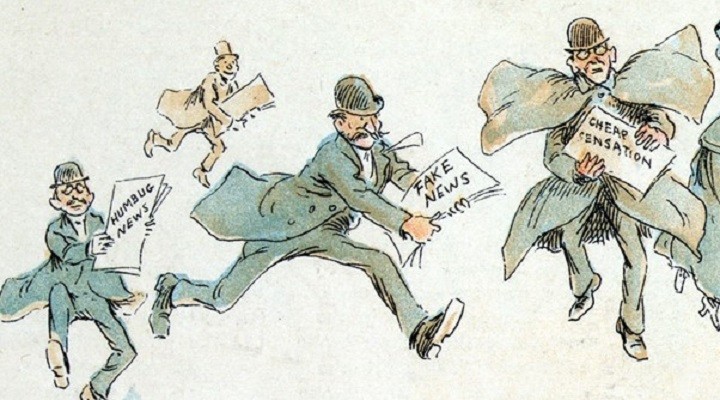Media and Information Literacy, what does it mean and why is it so important?
Did you know 61% of Australians surveyed do not feel confident they can identify misinformation in the networked media world and 73% can’t define ‘media literacy’ (Adult Media Literacy in Australia: Attitudes, Experiences and Needs). That’s a little alarming but not surprising when you consider the sheer volume of information, the numerous media and information sources available and the complexity of how these competing sources interact.
Global Media and Information Literacy Week (24-31 October), is a good time to explore your understanding of media and information literacy in the 21st century and why it matters now more than ever before.

A man with "fake news" rushing to the printing press. Frederick Burr Opper, Public domain, via Wikimedia Commons.
The Australian Media Literacy Alliance 2020 report says that media literacy is “the ability to critically engage with media and media technologies in all aspects of life” and “is essential for full participation in society”. Like all literacy, it’s concerned with the ability to “access, understand, analyse and evaluate information, make meaning, express thoughts and emotions, present ideas and opinions, interact with others and participate in activities” (Australian Curriculum Version 9.0). It’s a life skill complicated by constantly evolving digital media and information landscapes.
It is worth noting that most Australian adults (let alone younger Australians) use at least three types of media per day with social media dominating. In fact, most of us do not have a choice about using ever more media and information sources which allow us to not only carry out a host of daily tasks and activities, but also to function effectively as a citizen, and interact with other citizens, governments, and essential agencies.
Many of these interactions compete to advise and influence you, to grab your attention and convince you. Awareness of these efforts by people and algorithms is a part of media and information literacy. In your choice of where to get your information, news, entertainment, opinion, and advice about all aspects of your life, it's useful to be aware of the ‘noise’ and interference (intentional or unintentional) that may undermine the reliability and trustworthiness of the content.
And that’s leaving aside that there’s a world of absolute garbage out there just a few clicks away and that the scammers seem to be up all night dreaming up new ways of relieving you of your life savings.
So, what do we do about it?
We all need to upskill and be critical consumers and producers of content – we need to learn how to critically view and use information and media sources. The webpages of the 11th Global Media and Information Literacy Week taking place October 24-31, 2022, advise us to “think critically and click wisely”
Libraries are implicated here. A considerable part of what State Library does (based on our long experience building and delivering online and onsite services) is helping people to better navigate complex media and information landscapes.
Libraries have played a significant role in providing lifelong learning resources to the populations they serve helping you to ‘click wisely.’ By providing free access to and assistance with trustworthy, unbiased resources and the online and physical spaces to use these resources, libraries try to encourage informed citizens and by extension civil, balanced discussion.
One way to build your information literacy skills is to read widely and explore a range of diverse sources and viewpoints. Your State Library membership provides access to local, national, and international newspapers both current and historical, with some collections dating all the way back to the very first issue.
Get started and stay informed by exploring State Library's newspaper collections https://www.slq.qld.gov.au/research-collections/information-collections/newspapers, and explore LinkedIn Learning where you can find an introductory course on Information Literacy
Apart from taking advantage of all that the Library has to offer, there are other online resources to help you build your media and information literacy skills.
Useful and related links
ABC Education Media Literacy website is geared towards students and teachers but with everyone’s lifelong learning in mind, useful for everyone with sections exploring news literacy basics, fake news, media literacy news and more. https://www.abc.net.au/education/media-literacy/
Australian Media Literacy Alliance website. Look under ‘Latest Research’ for access to research reports carried out by AMLA. https://medialiteracy.org.au/
International Federation of Library Associations and Institutions - Fake News Infographichttps://upload.wikimedia.org/wikipedia/commons/thumb/2/2b/How_to_Spot_Fake_News.pdf/page1-768px-How_to_Spot_Fake_News.pdf.jpg
International Federation of Library Associations and Institutions - Global MIL Week 2022 https://repository.ifla.org/handle/123456789/2182
UNESCO Media and Information Literacy Week 2022. https://www.unesco.org/en/weeks/media-information-literacy
The American Library Association has a useful publication intended for American libraries but containing information applicable to everyone. https://www.ala.org/tools/sites/ala.org.tools/files/content/%21%20Media-Lit_Prac-Guide_FINALWEB_112020_0.pdf
More information
- One Search catalogue - http://onesearch.slq.qld.gov.au/
- Ask a librarian - https://www.slq.qld.gov.au/plan-my-visit/services/ask-librarian
- Library membership - https://www.slq.qld.gov.au/get-involved/become-member
Comments
Your email address will not be published.
We welcome relevant, respectful comments.